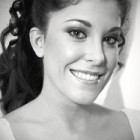Todays guest post is kindly provided by author Nina DAleo
Nina is the author of The Last City, which is tantalisingly described as an intoxicating blend of noir crime, science fiction and fantasy;'Blade Runner meets Perdido Street Station.
At the risk of sounding naiveor masochistic, I never really considered genre or subgenre when I began writing The Last City. Coming off the back of a creative writing degree, I can't claim it was lack of knowledge. I was aware of genre, I just didn't realise how important it was. I never thought that somewhere in the far off future the book would be passed over for publication, several times, due to it straddling genres (and the associated problems of marketing and placing a cross-genre story)and as every writer knows, this hurts. Even when you're a veteran of literary rejection, it's still hard to accept that something you've created and that you love will never see the light of day.
It left me wondering why I had made the fatal error of not considering the marketplace when writing the story. WellI'm going to blame it on some advice I was given while studying (because blaming others is always more fun). The advice went something like thiswrite what you want to read, write what you're passionate aboutIt sounded sane enough at the time. What I wanted to read and was utterly passionate about was fantasy worlds with futuristic mega cities, which blended tech and magical elements, and had created races of people and others. Because that's what was in my head and heart, that's what I ended up writing, only to hear in the same far off future that this advice is ill-advised and that writers are actually wiser to write what's selling'
At this point I could argue each sidewrite for love, write for salesand provide examples of both cross-genre and within-genre work that have found publishing success, but I won't, mainly because I think this should be done by people who actually know what they're talking about. I've spent the last ten years in an underground cave writing my book so I'll skip my lofty pontificating on the topic and get straight to the good bitthe bit where The Last City (through the efforts of an indefatigably determined agent) lands on the digital desk of Momentum Books. The rest of the tale involves that mythical Acceptance Letter and me joy-cryinga lot. It seems, from my novice perspective, that digital publishing is making it possible for cross-genre books like mine to be given a chance, which I find such an exciting prospectnot just as a writer, but as a reader. The creative possibilities seem infinite, and that's exactly how I like them.
So now it's back to the cave to do it all again'
Visit Ninas website | Twitter | Facebook
Enter to win a copy of'The Last City!


















This book sounds right up my alley. I will have to read it
Michael @ Literary Exploration recently posted..Question Tuesday: Is Your Preferred Crime Style Gritty, Hardboiled And Realistic; Or Genteel And Cosy, A Puzzle To Examine With Cruelty And Realism Downplayed?
It sounds brilliant, doesnt it?
Great post Nina.
I did a similar thing with my first book and, like you, found a home for it in the digital publishing world. When I write, I still follow the advice you were given 'write what you want to read, write what you're passionate about' but now I also consider genre a fraction more than I did the first time around and adjust my manuscripts ever so slightly to accomodate :)
All the best with the book, I hope it sells like hotcakes.
Thanks for visiting, Jan, and for your thoughtful responseyou make a great point about balancing creativity and marketability. Authors writing for publication do need to be aware of both audience and market, but I think that most authors who read widely will find that they do have such an awareness, whether they know it or not! I think by reading widely its possible to internalise conventions of structure, character, and narrative, and thus produce something that will appeal to a reading audience.
Thank you Michael and Jan!! And thanks for having me here Stephanie!!